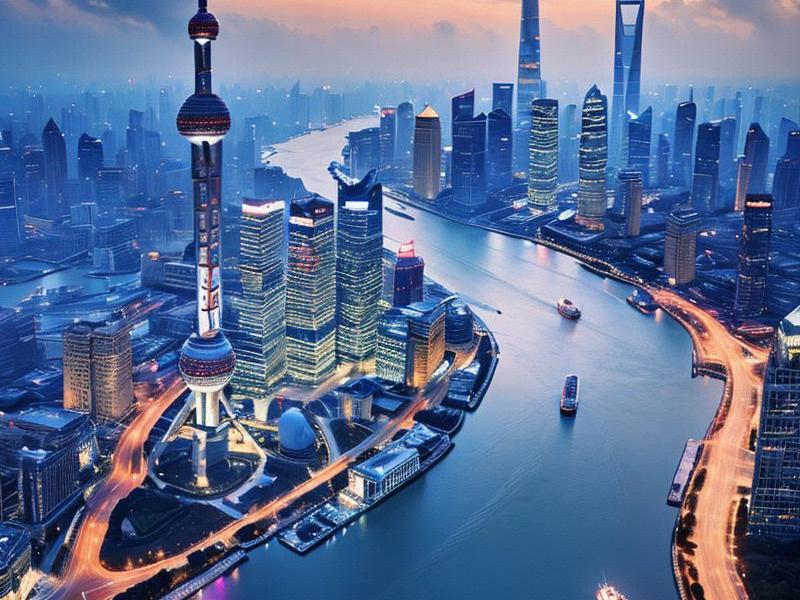This article delves into the multifaceted character of Shanghai, exploring its transformation from a historic port city to a global metropolis that stands as a beacon of innovation, culture, and economic prowess. It examines the city's urban development, cultural heritage, and its role in the global economy.

Shanghai, often referred to as the "Pearl of the Orient," is a city that has witnessed centuries of change and continues to evolve at an unprecedented pace. Located on the eastern coast of China, Shanghai is not only the largest city in the country but also one of the most dynamic and influential cities in the world. Its strategic location along the Yangtze River Delta has made it a key player in China's economic rise and a hub for international trade and finance.
The city's history dates back over 2,400 years, but it was during the 19th century that Shanghai began to emerge as a major international port. The opening of treaty ports after the First Opium War allowed Shanghai to flourish as a center for commerce and culture, attracting merchants and immigrants from around the globe. This period of rapid growth laid the foundation for Shanghai's cosmopolitan character, which is still evident today.
In the 20th century, Shanghai became synonymous with modernity and progress in China. The city was a focal point of the Chinese Communist Revolution and later a symbol of China's economic reform and opening up. The establishment of the Pudong New Area in the 1990s marked a new era of development for Shanghai, transforming it into a global financial hub. Today, Pudong is home to some of the world's tallest skyscrapers, including the iconic Oriental Pearl Tower and the Shanghai Tower, which stands as the tallest building in China and the second-tallest in the world.
Shanghai's urban landscape is a testament to its rapid development and innovative spirit. The Bund, a historic waterfront area, showcases a blend of colonial architecture and modern skyscrapers, offering a glimpse into the city's past and present. Nanjing Road, one of the world's busiest shopping streets, is a vibrant commercial hub that attracts millions of visitors each year. The city's extensive metro system, one of the most extensive in the world, facilitates seamless transportation across its vast urban sprawl.
爱上海419论坛
Culturally, Shanghai is a melting pot of traditions and modernity. The city is renowned for its art scene, with galleries, theaters, and music venues showcasing both traditional Chinese art forms and contemporary works. The Shanghai Museum, housed in a stunning classical Chinese building, is a treasure trove of ancient Chinese art, including ceramics, calligraphy, and paintings. The city's annual Shanghai International Film Festival is a prestigious event that draws filmmakers and audiences from around the globe.
Shanghai's culinary scene is another aspect of its rich cultural tapestry. The city is famous for its xiaolongbao (soup dumplings), shengjianbao (pan-fried dumplings), and other Shanghainese delicacies. These dishes, characterized by their delicate flavors and intricate preparation, reflect the city's unique culinary heritage. In recent years, Shanghai has also become a hotspot for international cuisine, with a wide array of restaurants offering diverse dining experiences.
The city's commitment to sustainability and green development is evident in its urban planning initiatives. Shanghai has set ambitious goals to reduce carbon emissions and promote renewable energy. The city's green spaces, such as Century Park and Zhongshan Park, provide residents and visitors with opportunities to enjoy nature amidst the urban hustle and bustle. The Huangpu River, which flows through the heart of the city, has been revitalized with the creation of waterfront promenades and eco-friendly developments.
上海品茶网
Shanghai's role in the global economy cannot be overstated. As one of the world's leading financial centers, the city is home to the Shanghai Stock Exchange, one of the largest stock exchanges in Asia. The city's free trade zone has attracted numerous multinational corporations, fostering innovation and entrepreneurship. Shanghai's strategic position in the global supply chain and its advanced infrastructure make it a key player in international trade.
The city's education and research institutions are also contributing to its status as a global innovation hub. Fudan University and Tongji University are among the top universities in China, producing graduates who are at the forefront of science, technology, engineering, and mathematics (STEM) fields. Shanghai's research parks and incubators provide a fertile ground for startups and tech companies, driving innovation and economic growth.
Despite its rapid development, Shanghai remains committed to preserving its cultural heritage and improving the quality of life for its residents. The city has implemented various initiatives to address environmental challenges, enhance public transportation, and promote cultural activities. The Shanghai Urban Planning Exhibition Center showcases the city's vision for sustainable development and urban renewal.
上海贵族宝贝sh1314
Shanghai's international collaborations and partnerships further underscore its role as a global city. The city has established sister city relationships with numerous international cities, fostering cultural exchanges and economic cooperation. Shanghai's participation in global forums and initiatives, such as the United Nations Climate Change Conference, highlights its commitment to addressing global challenges.
In conclusion, Shanghai is a city that embodies the spirit of innovation, culture, and resilience. Its transformation from a historic port city to a global metropolis is a testament to the dynamism and adaptability of its people. As Shanghai continues to grow and evolve, it remains a vital part of China's narrative and a key player on the world stage. The city's story is one of ambition, creativity, and a relentless pursuit of progress, making it a source of inspiration for cities around the globe.